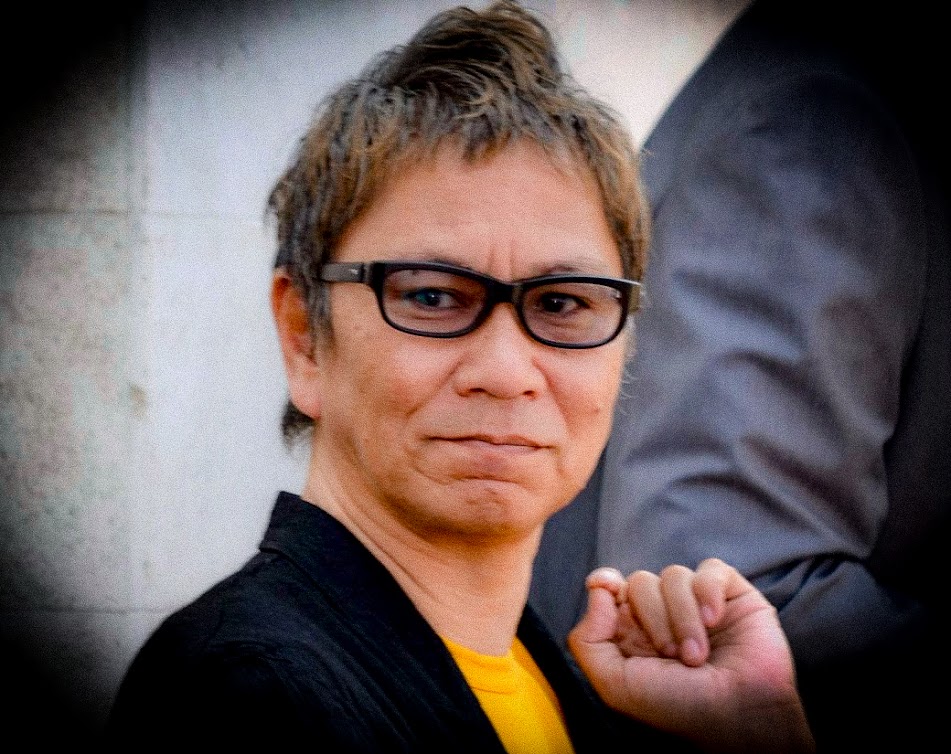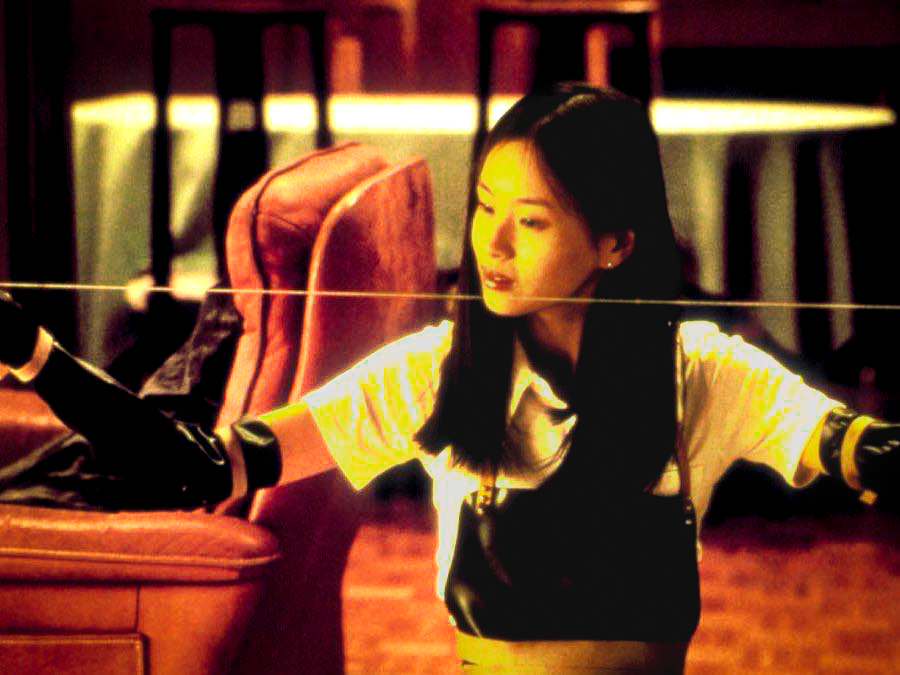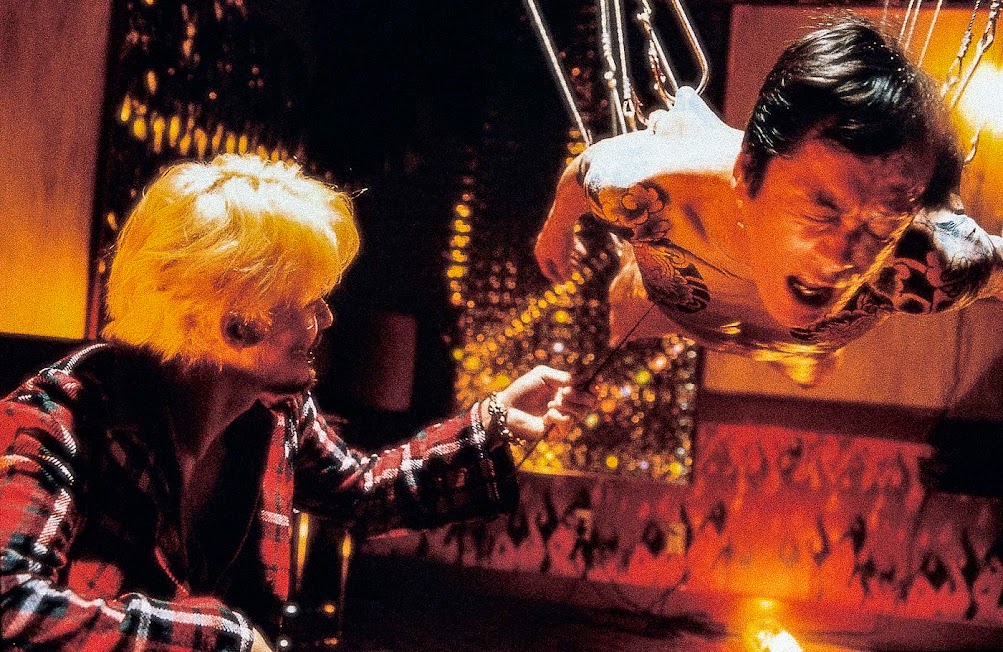“I don't think about the audience, I don't think about what makes them happy, because there's no way for me to know. They think of the audience as a mass, but in fact every person in the audience is different. So entertainment for everyone doesn't exist.”
A highly prolific and controversial Japanese filmmaker, Takashi MIIKE was born on August 24, 1960 in Yao, Osaka, Japan. Under the guidance of renowned filmmaker Shohei IMAMURA (a two-time Palme d’Or winner at Cannes), Miike graduated from the Yokohama Vocational School of Broadcast and Film.
He started from the bottom, grew up in "a very bad area" of Osaka, he would frequently skip school to go and watch Bruce Lee kung fu movies, and dreamed of becoming a motorcycle racer. As a teenager with no money and limited academic prospects, he enrolled at the Yokohama Academy of Visual Arts, after hearing on the radio that they would accept anyone. The academy's founder is Shohei Imamura, director of Cannes winners The Eel and The Ballad of Narayama, who later hired Miike as an assistant director. "He taught me what a director needed to be," he says.

From then on, it was easy to pick up directing work on low-budget movies for Japan's substantial straight-to-video market. Miike's debut theatrical release, the 16mm Shinjuku Triad Society, won him a best new director nomination from the Director's Guild of Japan. It was successful enough to generate two sequels, and he hasn't stopped working since.
He has directed over one hundred theatrical, video and television productions since then.
"His first international release, 1999's Audition, can be seen as something of a watershed in his career, or perhaps a Trojan horse. "
Takashi Miike has achieved international notoriety for depicting shocking scenes of extreme violence and bizarre sexual encounters. Many of his films (but not all) contain graphic and lurid bloodshed, often portrayed in an over-the-top, cartoonish manner. Much of his work depicts the activities of criminals, and he is known for his black sense of humor and for pushing the boundaries of censorship as far as they will go.
-
"Takashi Miike is the black, beating heart of world cinema. The man whose presence on festival circuits instills equal parts fear and wonder, the man you have to beware or watch. Miike’s rakish presence is perhaps best summed up by the title of his 2001 Yakuza movie, “Agitator.” Love or hate what he does, to reckon with it is to have your taste tested and your buttons pushed. "
AUDITION (1999)
Taken from a novel written by Ryu Murakami,Audition starts by introducing us to a widower, Shigeharu Aoyama, and his teenage son Shigehiko. Shigehiko doesn’t want his father to be alone any more. Aoyama’s friend, Yoshikawa, doesn’t want him to be alone any more either and devises a way to let Aoyama pick someone.
They will put together a fake audition for a script and put out a casting call for the lead female character. During the hours of interviews, in walks Asami Yamazaki, an attractive and soft spoken young woman that seems to strike a chord with Aoyama.
What begins as a gentle and romantic affair turns into a disturbing nightmare, full of sado-masochism, torture and violence.
"An outstanding, terrifying horror picture"
AUDITION (1999)
AUDITION (1999) (Effed UP Movies) >>>
ICHI THE KILLER (2001)
When Ichi meets up with extreme masochist Kakihara (Tadanobu Asano), the two soulmates are destined for a very bloody showdown. Banned in many countries and censored in most others, “Ichi” might be difficult for many viewers to watch, but it’s one of the director’s best-known, and most accomplished films.
“Ichi the Killer” is about the disappointment and potentially seductive power of violence, and the nightmare of being simultaneously drawn in, and alienated by images of men hurting women as a means of indirectly hurting themselves. Mike’s film, a rambling adaptation of Hideo Yamamoto’s manga comic book, follows Kakihara (Asano), a sadomasochistic mobster, and his roundabout quest to find, and either kill or be killed by Ichi (Nao Ohmori), a nebbish and reluctant assassin/serial killer who leaves all of his victims with their guts draped across the furniture, and dripping from the walls.
Roger Ebert
ICHI THE KILLER (2001)
ICHI THE KILLER (2001) (Effed UP Movies) >>>
GOZU (2003)
At a yakuza gathering, Ozaki (Shô Aikawa of the Dead or Alive films) unsettles the boss (Renji Ishibashi) when he claims a small dog outside the restaurant is a "yakuza attack dog" and viciously smashes it to death. Minami (Hideki Sone) is assigned to drive the apparently unstable Ozaki to a remote location and kill him. Minami considers Ozaki a "brother," and feels ambivalent about this assignment.
After several odd incidents on the road, Minami ends up in the small town of Nagoya, where things get even odder.
GOZU (2004) (Effed UP Movies) >>>
13 ASSASSINS (2010)
The film is terrifically entertaining, an ambitious big-budget epic, directed with great visuals and sound by Takeshi Miike. The last 45 minutes are devoted to an inventive and ingenious battle scene, but it's not the sort of incomprehensible mayhem we often find in recent actioners. It's a lesson to the queasy-cam auteurs, because Miike choreographs the action to make it comprehensible — and, more important, has spent his first two acts establishing the characters. We know who the 13 samurai are, and we understand why many of them behave as they do under threat of death. The care taken with the screenplay and the shot composition deserves comparison with Kurosawa's (even better) "Seven Samurai."
The film opens with stark, bloody simplicity. A man kneels in a courtyard and disembowels himself in protest against Lord Naritsugu (Goro Inagaki), the half-brother of the shogun. This seppuku was inspired by Naritsugu's cruelty, which we see demonstrated in appalling detail. He amputates some victims, kicks the severed heads of others across rooms and exercises the right to rape anyone in his domain. He isn't a twisted caricature, but a preening narcissist; the shogun inexplicably plans to promote him.
"13 Assassins" has what many action pictures need, a villain who transcends evil and ascends to a realm of barbaric madness. Against this creature and his private army, a band of samurai is mustered to end his terror. Their heroism against impossible odds is a last hurrah for the samurai code; the film is set in 1844, toward the end of the medieval Edo period, when true samurai warriors were growing rare.
ROGER EBERT
13 ASSASSINS (2010)
First Love (HATSUKOI 2019)
A boxer with a brain tumor, a crooked cop with terrible luck, a screw-up yakuza who’s seen too many movies, a dismembered Chinese gangster who wields a pump-action shotgun with his one remaining arm, a terrified prostitute . Those are just some of the many different characters that prolific Japanese auteur Takashi Miike mix into his new gangster film.
A couple (young boxer and a prostitute) get caught up in a drug-smuggling scheme over the course of one night in Tokyo. The film is a strange blend of comedy, romance, and violence one of the most entertaining Takashi Miike films.
First Love (2019)
FIRST LOVE and the Death of the Yakuza Film | TAKASHI MIIKE | TIFF 2019>>>
Fully revised and updated edition of the bestselling guide to Japan's most prolific and successful film director Takashi Miike. This third pressing ofAgitator features a new and expanded 16-page colour section, completely updated DVD information and several brand new reviews of Miike films that were unavailable for review at the time of the book's initial production.
Takashi Miike's popularity continues to grow, and there is no sign of any slow-down of interest in this book.
TAKASHI MIIKE interview





















.jpg)